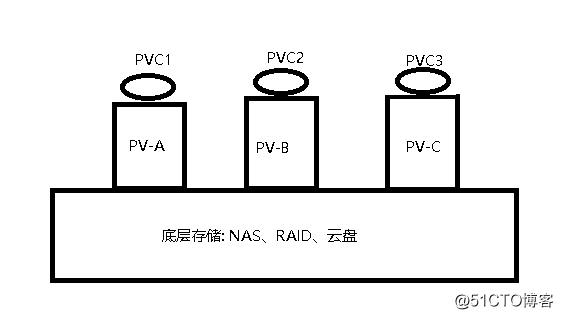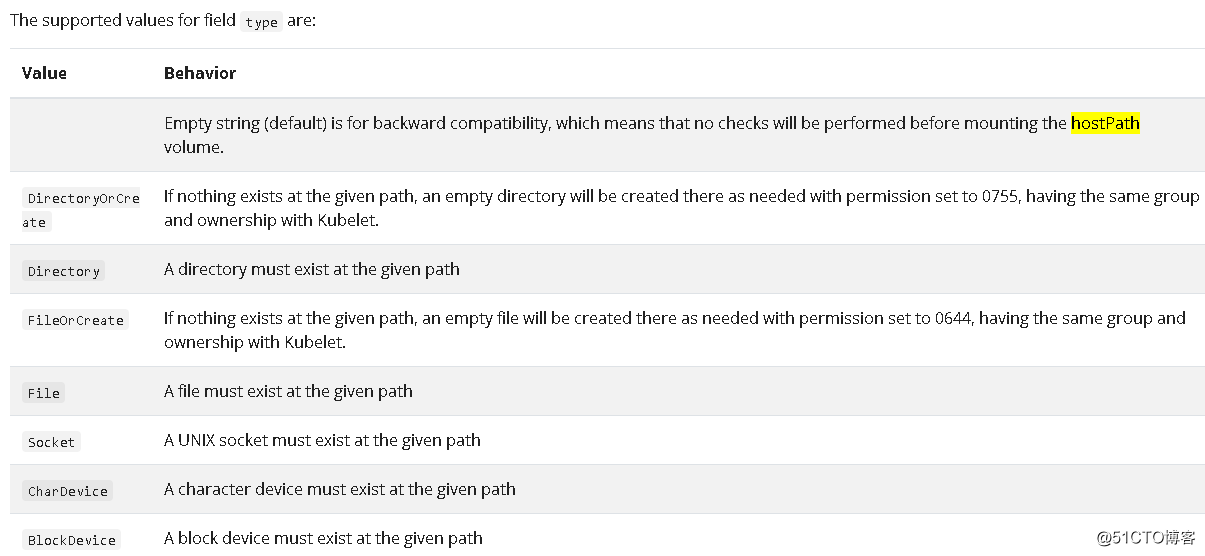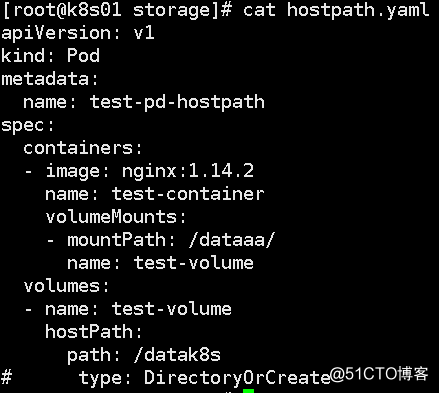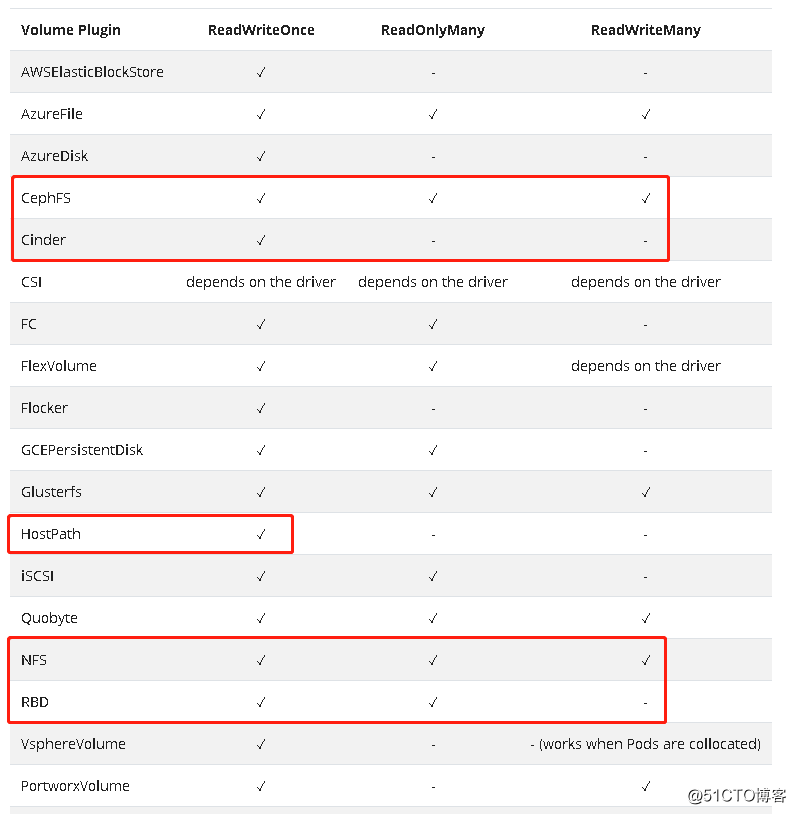
底层存储支持各种方式,NAS、云盘、CEPH是我们常用的存储方式之一。
这是最底层的硬件存储,在底层硬件基础之上再开辟 PV(Persistent Volume)。
通过PV申请PVC(PersistentVolumeClaim)资源。
实现方式分为两种,通过定义PV再定义PVC; 直接动态申请PVC。2、卷访问模式
1 ) RWO ROM RWM
ReadWriteOnce 卷可以被一个节点以读写方式挂载;
ReadOnlyMany 卷可以被多个节点以只读方式挂载;
ReadWriteMany 卷可以被多个节点以读写方式挂载。2)pv 的几种生命周期
3) pv生命周期的4阶段
Available 可用状态,未与PVC绑定
Bound 绑定状态
Released 绑定的PVC删除、资源释放、未被集群收回
Failed 资源回收失败3、kubernetes目录挂载方式
0 ) emptyDir
emptyDir,它的生命周期和所属的 Pod 是相同的,同生共死。
empty Volume 在 Pod 分配到 Node 上时会被创建, 自动分配一个目录。
当 Pod 从 Node 上删除或者迁移时,emptyDir 中的数据会被永久删除1)hostpath模式,创建在node节点,与pod 生命周期不同
将nginx 镜像中/data 挂载到 宿中的/datak8s, yaml文件如下:
apiVersion: v1
kind: Pod
metadata:
name: test-pd-hostpath
spec:
containers:
- image: nginx:1.14.2
name: test-container
volumeMounts:
- mountPath: /data/
name: test-volume
volumes:
- name: test-volume
hostPath:
path: /datak8s
type: DirectoryOrCreatehostPath type 模式如下:


在node节点 /datak8s 下创建文件
删除test-pd-hostpath,修改yaml文件
kubectl apply -f hostpath.yaml
查看镜像内目录
在低版本某云中,使用该种对应关系进行日志收集, node节点使用同样的目录,pod中由程序 logback 来创建日志
2、使用nfs-pvc 做为数据存储 或者在云端可以使用云存储挂载但仅局限于RWO环境
k8s 挂载NFS的 rbac.yaml 创建
apiVersion: v1
kind: ServiceAccount
metadata:
name: nfs-client-provisioner
namespace: default
---
kind: ClusterRole
apiVersion: rbac.authorization.k8s.io/v1
metadata:
name: nfs-client-provisioner-runner
rules:
- apiGroups: [""]
resources: ["persistentvolumes"]
verbs: ["get", "list", "watch", "create", "delete"]
- apiGroups: [""]
resources: ["persistentvolumeclaims"]
verbs: ["get", "list", "watch", "update"]
- apiGroups: ["storage.k8s.io"]
resources: ["storageclasses"]
verbs: ["get", "list", "watch"]
- apiGroups: [""]
resources: ["events"]
verbs: ["create", "update", "patch"]
---
kind: ClusterRoleBinding
apiVersion: rbac.authorization.k8s.io/v1
metadata:
name: run-nfs-client-provisioner
subjects:
- kind: ServiceAccount
name: nfs-client-provisioner
namespace: default
roleRef:
kind: ClusterRole
name: nfs-client-provisioner-runner
apiGroup: rbac.authorization.k8s.io
---
kind: Role
apiVersion: rbac.authorization.k8s.io/v1
metadata:
name: leader-locking-nfs-client-provisioner
namespace: default
rules:
- apiGroups: [""]
resources: ["endpoints"]
verbs: ["get", "list", "watch", "create", "update", "patch"]
---
kind: RoleBinding
apiVersion: rbac.authorization.k8s.io/v1
metadata:
name: leader-locking-nfs-client-provisioner
namespace: default
subjects:
- kind: ServiceAccount
name: nfs-client-provisioner
namespace: default
roleRef:
kind: Role
name: leader-locking-nfs-client-provisioner
apiGroup: rbac.authorization.k8s.io#pvc 创建
apiVersion: v1
kind: PersistentVolume
metadata:
name: pv-test
spec:
capacity:
storage: 1Gi
accessModes:
- ReadWriteMany
persistentVolumeReclaimPolicy: Recycle
nfs:
path: /nfs/k8s
server: 10.0.0.181
---
kind: PersistentVolumeClaim
apiVersion: v1
metadata:
name: pvc-test
spec:
accessModes:
- ReadWriteMany
resources:
requests:
storage: 100Mi
#创建yaml文件并挂载pvc
vim nginx2-pvc-deployment.yaml
apiVersion: apps/v1
kind: Deployment
metadata:
name: nginx2-deployment
labels:
app: nginx2
spec:
replicas: 2
selector:
matchLabels:
app: nginx2
template:
metadata:
labels:
app: nginx2
spec:
containers:
- name: nginx2
image: nginx:1.14.2
command: [ "sh", "-c", "while [ true ]; do echo ‘Hello‘; sleep 10; done | tee -a /logs/hello.txt" ]
ports:
- containerPort: 80
volumeMounts:
- name: nginx2-pvc-storageclass
mountPath: /logs
volumes:
- name: nginx2-pvc-storageclass
persistentVolumeClaim:
claimName: pvc-test#部署nginx2 deployment
kubectl apply -f nginx2-pvc-deployment.yaml

#删除 nginx2,hello.txt 文件还存在
[root@k8s01 storage]# kubectl delete -f nginx2-pvc-deployment.yaml
deployment.apps "nginx2-deployment" deleted
原文:https://blog.51cto.com/keep11/2622798